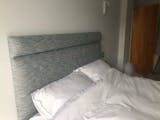There’s a common myth about mattresses, that the thicker they are, the firmer they are to sleep on. This is not correct! Some cheap, deep mattresses are uncomfortably soft. They can also sag and slope unpleasantly or give you sleepless nights due to protruding metalwork. Bed manufacturing experts, however, can craft a slimline mattress for a bespoke bed that’s incredibly supportive.
Watch out for crafty marketing ploys too. Some mass-produced mattresses can mislead you, using words such as 'plush', 'luxurious', 'deep' and 'supportive' when in fact the product will let you down. It’s not what it looks like that matters. It’s what’s inside that counts!
Is mattress firmness crucial?
All quality mattresses should be supportive, equalising weight distribution as you sleep. However, firmness levels range from soft to hard and relate to what you believe is the most comfortable surface to lie on. Knowing how to test mattress firmness relates to working out the level of sleep comfort that best suits you. It will take into account body dimensions, weight and sleep position. How comfortable your mattress is, effects the quality of your sleep and whether you wake up feeling refreshed with no residual aches and pains. A lot of the decision rests on personal preference, however. Do you want a firm product to hold you straight or a softer mattress that ‘hugs’ you in the night? So, now let’s ‘dig down’ on how to test mattress firmness!

Springs v memory foam mattresses
Trying to decide which mattress meets your requirements can often start with the question is memory foam or a spring mattress firmer? A quality mattress containing coiled springs can be incredibly comfortable and supportive, and it’s possible to specify the degree of firmness added.
However, when you order a memory foam product – like our Memory Deluxe Mattress - you can still decide whether you want the specialist foam to be anything from soft to extra firm. But it all comes down to which type of mattress matches your sleep experience preferences, then making sure you buy from a bespoke bed supplier.

Product: Memory Foam Deluxe Mattress
Mattress firmness scale
As already mentioned, marketing terms tend to be open to interpretation and are not universal. You can see an extra firm mattress online that to another retailer is in their standard range. However, a sliding scale is sometimes used to show the relative firmness of mattresses. Knowing this can guide you when questioning a bed salesperson or when commissioning a made-to-measure bed.
Level 1 - The softest type of mattress is not common, as it’s an option that gives most people a ‘sinking’ sensation.
Level 2-3 - This would be a soft, plush mattress that moulds to your body shape.
Level 4-6 - A medium-firm mattress is the most popular type. This would yield to a body shape to a slight degree, but will still retain its supportive form.
Level 7-9 - This would be a harder mattress that is not pliant when you press down on it and which holds its shape when you lie down.
Level 10 - The firmest mattress is also rarely appropriate as it has no give and provides a rock hard sleep surface.

Drill down on mattress construction
When searching for a supplier of mattresses, you need to look at their manufacturing techniques and materials. It’s a key part of knowing how to test mattress firmness.
A mattress contains mechanical support (such as coiled springs), upholstery to make it comfortable and then outer detailing that dictates aesthetics, breathability, and other sleep experience factors. A mattress's spring tension is largely the source of its firmness level. Most mattresses provide a degree of ‘give’ in the spring unit that is reliable and even, despite any body movements you make.
Cheap mattresses have poorer quality springs, random spring tension and contain recycled fibres of dubious origin or inexpensive foam. Even if they seem firm to begin with, they can quickly prove uncomfortable! The best bed manufacturers use high-quality materials and engineer mattresses to offer consistent comfort and durability, with well-made springs and stable upholstery. If you shop with us, you can actually choose a quality product – like our Memory Foam 1200 Mattress – and then decide the tension (or firmness) you want to be added to its construction!

Product: Memory Foam 1200 Mattress
Sleep positions and mattress firmness
If you’re still not sure which mattress level you want to opt for, or even test out, the position you sleep in offers clues. Also, the general rule of thumb is that the larger your body weight, the firmer your mattress should be to offer the right degree of support and ensure bed durability. The same applies to people who move excessively at night.
It’s subjective, of course, but many side sleepers find medium to soft mattresses more comfortable. They yield to pressure points such as elbows, hips and shoulders but still cradle your curved features properly.
Front sleepers often find that a mattress in the medium to firm range is best. When sleeping on your stomach, you don’t want the bed surface to be too deep, putting your spine in an unhealthy ‘u’ shape. Back sleepers can also benefit from a medium to firm mattress, which keeps your spine well-aligned. If you sleep in a combination of positions, getting a medium mattress is a good idea.

If in doubt, get free advice on mattress firmness
If you're concerned, for example, why your current mattress is sagging in places? You can check out our blog to find some answers. Plus, if you have the guidance above, you should now have a firm understanding of what can cause poor sleep. Also, with a good idea of the scale of firmness and type of construction you want, you can then chat to us, as we are a bespoke bed and mattress maker.
Endurance Beds handcraft mattresses that match your firmness specifications flawlessly. In fact, there’s a lot of ways you can make our mattresses more bespoke for you! Plus, we are always happy to provide free advice, guiding you on what to look for in mattresses and the cost of buying a made-to-order mattress that’s ideal for you.







